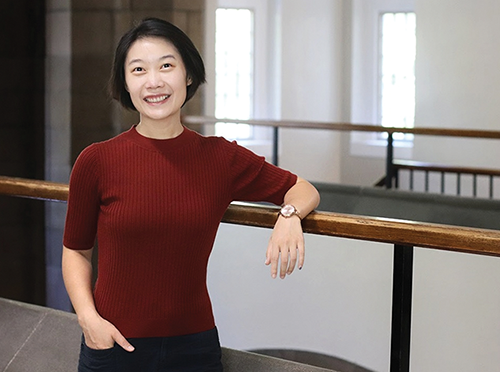Cool Girls and Quantum Science
Yishu Wang didn't set out to be a scientist. She just wanted to be a "cool kind of girl" like the figures she grew up admiring (Marie Curie, Rosalind Franklin, and Chien-Shiung Wu, to name a few). It wasn't discovery or invention that first drew her to science and engineering. It was the women who'd done it before.

Yishu Wang
"Very luckily, I found out only later that the topics related to natural sciences, engineering, and technology are indeed attractive to me," she said.
A native of Zhengzhou, the capital city of China's Henan Province, Wang discovered her current research passion—quantum materials—in a classroom at Tsinghua University in Beijing.
"I first got interested in this area when I sat in an undergraduate class talking about superconductivity," she explained.
For Wang this phenomenon perfectly encapsulated theory, experiment, and technological advances. That's part of what she finds intriguing about quantum materials. She explained that under most circumstances, quantum mechanics shows up only at atomic and subatomic scales, but quantum materials embody quantum mechanics at macroscopic scales. If quantum phenomena could be realized in solid-based devices, scientists see potential gains for both fundamental and practical purposes.
"For the former, we would like to expand our knowledge of quantum mechanics," she explained. "For the latter, we hope to design functional devices with these materials which offer functions that the silicon-based devices could not achieve."
After completing a bachelor's degree in engineering physics, Wang went on to earn a master's degree (University of Chicago) and a PhD (California Institute of Technology), both in physics. Over time she developed an expertise in quantum magnetism, which brought her to UT with a joint appointment in Materials Science and Engineering (MSE) and Physics and Astronomy. With MSE as her home department, she's also part of the interdisciplinary Quantum Materials for Future Technologies research cluster.
Wang is particularly interested in introducing device-based measurements to quantum materials and in turn applying the discovery of quantum materials to designing devices. With a foot in both MSE and physics, she's already got a strong group of colleagues who synthesize materials, develop theoretical models, and conduct experimental measurements. She sees the benefits of this collaboration for her own work as well as the broader research community.
"The complexity level of research in quantum science and technology has grown rapidly and is almost beyond (what) a single research group can comfortably handle," she explained. "To have a group of colleagues who share common interests but have different expertise is the best way to tackle challenges and make major contributions in this field. The quantum cluster is playing such a role and helps form a strong bond within our community. The access to collaboration and the quality of local discussion is going to be the valuable advantage."
Wang is already building a research group and taking her knowledge to the classroom, where she's taught an intro class on materials science and a cross-listed MSE/Physics course on the structure of matter.
When she's not unravelling quantum mysteries, she said she loves to hike ("for which East Tennessee is a great place to live"), watch movies, and especially read. In fact, it was reading that introduced her to the scientific heroes that inspired her career.
"I was so charmed by their personalities and inspired by their dedication to exploring nature," she said. "I thought that was the cool kind of girl that I hoped to grow into."
Back to Cross Sections, Spring 2023